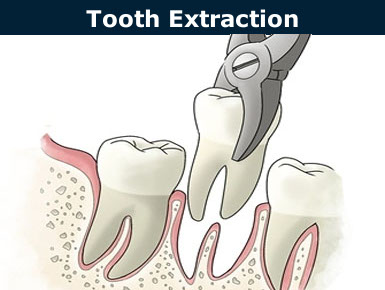Dental Tooth Extraction in Burbank
At My Dentist Burbank, Dr. Sahakyan offers expert tooth extraction in Burbank, ensuring optimal dental health for patients. Tooth extraction is a common and simple procedure. Thanks to our experienced specialists, patients experience minimal discomfort. Contact Dr. Sahakyan, the best dentist in Burbank, for your evaluation. Call 1-818-578-2332 for an appointment today.
What Is a Tooth Extraction?
Tooth extraction is one of the most common surgical manipulations in Burbank. The essence of this process consists in extracting the tooth, its root, or its parts from the bone socket of the jaw. This is achieved by means of special dental instruments. Medical manipulation for the removal of teeth is carried out, if possible, with minimal damage to the surrounding bone and soft tissues. This approach is necessary in order to avoid serious infectious complications and to prevent the functionality loss of the jaw.
When to Remove a Tooth?
Tooth removal is necessary in the following cases:
- Fracture of the tooth root: A fractured root causes pain, makes eating difficult, and negatively affects nearby teeth.
- Unsuccessful retreatment of root canals: When previously treated teeth fail to heal, extraction becomes necessary.
- Misaligned wisdom teeth: Wisdom teeth in the wrong position or with pathological processes may require removal.
- Severe tooth decay: Widespread caries that cannot be treated will require extraction.
- Chronic periodontitis: Severe inflammation, especially when it extends to bone tissue, makes saving the tooth impractical.
- Infected tooth: In cases of severe infection, it may be essential to extract a tooth that is infected to prevent further complications.
- Cracked tooth: A tooth crack that compromises the structure often leads to extraction.
- Diseases of tissues surrounding the tooth: Conditions like severe gum disease can make tooth removal necessary.
- Correction of occlusion: In some cases, tooth extraction may be needed to correct bite issues.
How Is the Tooth Removed? Tooth Extraction Process 
Extraction of the tooth is carried out strictly in the dentist’s office. This manipulation uses special dental instrumentation and preparations for general or local anesthesia. The duration of the operation depends on the severity of the patient’s condition and the number of teeth that are prone to tooth pathology.
Stages of Tooth Extraction
Extraction includes the following steps:
- Local anesthesia;
- Separation of the gum from the neck with a special scapula;
- The application of forceps, which is to be removed;
- Advance the cheeks to the root, clamping, and fixing;
- Dislocation from the hole;
- Extraction from the alveoli;
- Suturing on soft tissues.
Tooth Extraction Healing Stages
- First 24 Hours: A blood clot forms to protect the site. Avoid rinsing or straws.
- 2-3 Days: Swelling and discomfort peak. This is often the worst day of pain after wisdom tooth extraction.
- 1 Week: Swelling reduces, and soft tissue starts healing.
- 2 Weeks: Most healing is complete; regular activities can resume. Follow your dentist’s advice on what to eat after tooth extraction.
- 4-6 Weeks: Bone continues healing, with full recovery taking longer.
Following the proper dos and don’ts after wisdom tooth extraction aids in smooth recovery.
Different Types of Tooth Extraction
There are two types of procedures for tooth extraction:
Simple Tooth Extraction
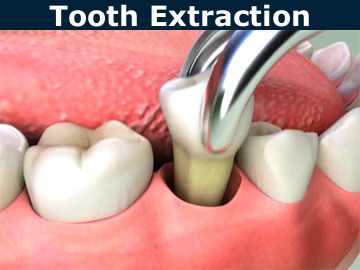
A simple tooth extraction is the removal of a mobile or single-root tooth when there is no need to use special tools and additional medical devices.
Surgical Tooth Extraction
Surgical tooth extraction or complex extraction is the removal using special tools and tools to extract the tooth from the bone. Complex tooth extraction implies the need to cut the soft tissues covering the tooth.
The surgery to remove the teeth is carried out with minimal damage to surrounding tissues, regardless of the complexity. Dental extraction, like any surgical manipulation, is performed under effective anesthesia, most often under local anesthesia. Anesthesia is selected by the Burbank dentist individually for each patient, depending on the following: the scope of the planned work, the type of treatment provided, characteristics, and the health status of the patient. No patient feels pain directly during the removal of the tooth.
The tooth extraction time can be from a few seconds to an hour or more. After removal, Dr. Sahakyan at My Dentist Burbank prescribes the necessary anti-inflammatory therapy.
Wisdom Tooth Extraction Burbank
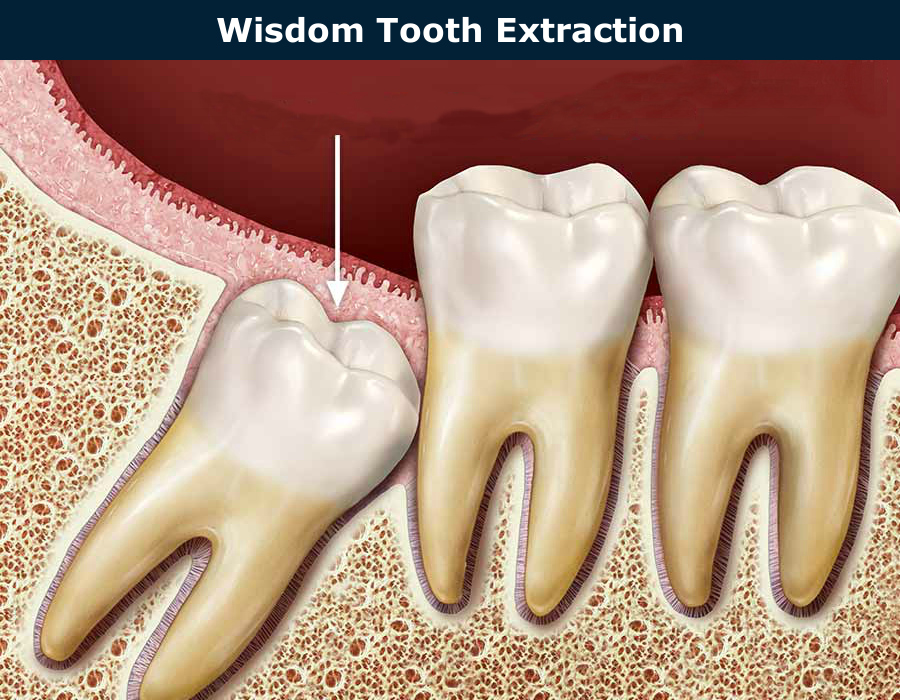
Wisdom teeth are officially referred to as third molars. They are the last teeth to develop. Wisdom teeth are fully developed between the ages of 15 and 20.
The wisdom tooth is a problem for many people. The main cause of this problem is the pain that occurs when it erupts due to a lack of sufficient space in the dental arch. In this case, the wisdom tooth should be removed as soon as possible. Not removing wisdom teeth on time will create many more complications over time.
In case there is enough space in the dental arch, the teeth can stand in their place, without touching the gingival tissue surrounding them. In this case, the wisdom tooth does not have to be removed.
Wisdom Tooth Extraction Types
Soft Tissue Impaction Extraction
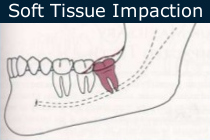
There is enough jaw bone to let the wisdom tooth erupt. But there is not enough room to let the gum tissue recede. It would allow to process of an adequate and proper cleaning of the tooth.
Partial Bony Impaction Extraction
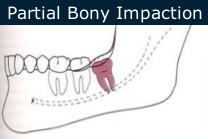
This is a wisdom tooth that has partially erupted the surface. It creates cleaning problems and cannot function in the chewing process.
Complete Bony Impaction Extraction
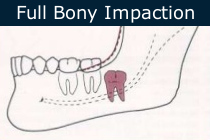
There is no room for the tooth to erupt to the surface. This impaction is included in the jaw bone and often rises at severe angles, and perhaps dames adjacent teeth.
Tooth Extraction Aftercare
After tooth extraction dentists at My Dentist Burbank recommend:
- Do not rinse your mouth. Rinsing can damage the upper layer of the wound, which can lead to its opening and infection.
- Do not eat for the first hours after tooth extraction. Avoid smoking for a few days.
- Avoid hot drinks. They can cause swelling and provoke a bleeding wound.
- Soothe the pain with analgesics. The first tablet can be taken right after the tooth extraction, under the effect of local anesthesia.
- Apply cold.
- If the wound is unbearable, your temperature rises, a tumor appears or other problems arise, you need to see your dentist as soon as possible.
Tooth extraction is a common procedure and the best dentist in Burbank, Dr. Sahakyan is happy to help you through. To schedule your evaluation, call 1-818-578-2332 or Contact us today.
FAQs
Can you go to work the day after tooth extraction?
When to stop using gauze after wisdom tooth extraction?
How many hours can I eat after wisdom tooth extraction?
What happens if the rotten tooth is not removed?
When can I smoke after wisdom tooth extraction?
When can I eat normally after wisdom tooth extraction?
When can I drink soda after wisdom tooth extraction?
Can a tooth extraction cause headaches?

